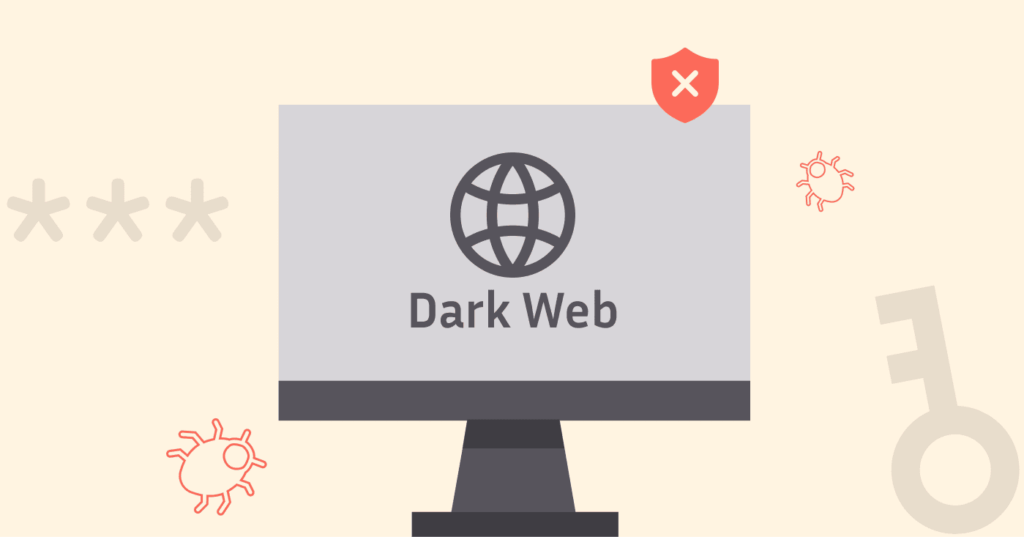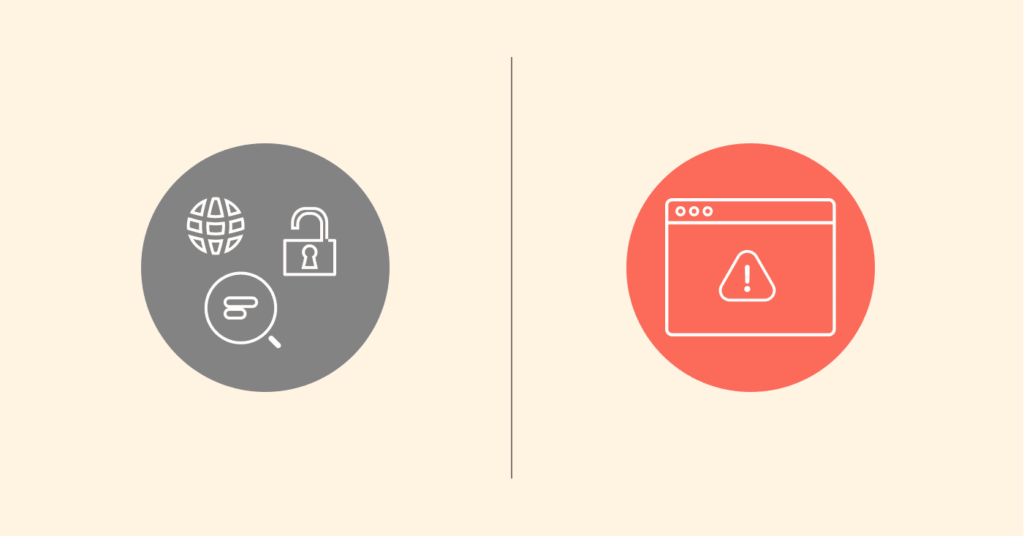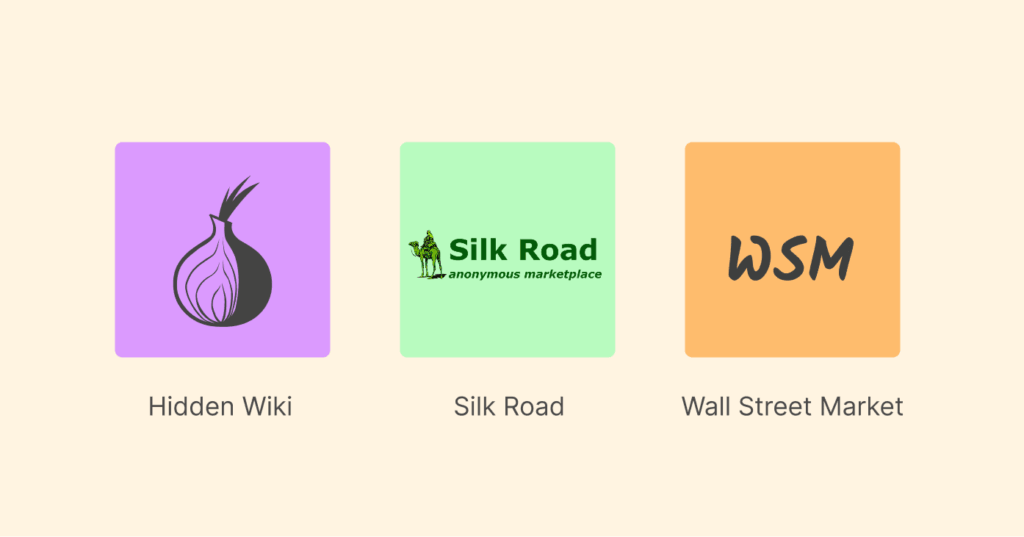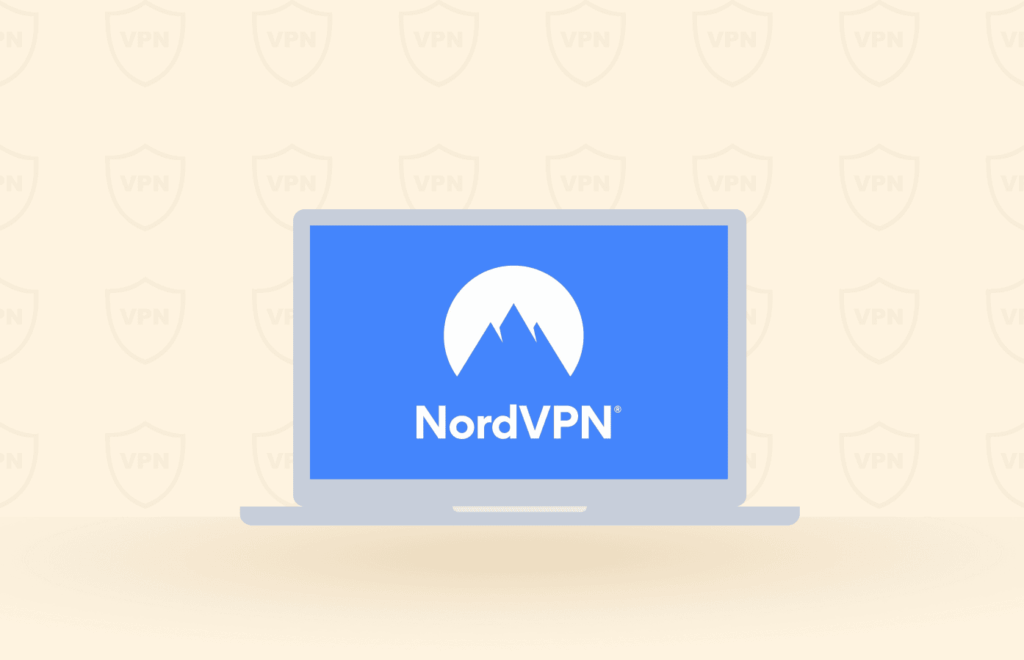The dark web has remained a secret in society for over the years. Brought to life by the imagination of books and cinema, it has become an illegal market in which bank details are sold, weapons are offered by faceless associates, and top secret files are slung by moles.
This description, however vague, is not false. The reality is much darker and riskier, and far more intricate than what Hollywood creates. Here is one thing most people do not realize: You do not have to be a criminal to face serious consequences for your actions while on the dark web. Only one negligent click can unleash malware or other software that will seize control of your device.
In this guide, we’ll go over the dangerous side of the dark web, how curiosity is costly, what is illegal and legal, what scams and dangers you will encounter, and all the information you need to separate myths from reality.
How is the dark web dangerous

The dark web is not a singular location; it is a series of networks that are concealed and mostly accessed using the Tor browser. There are some legitimate, valid uses for it, but the risks cannot be ignored. Below we list major dark web dangers:
- Cybercrime would not thrive without anonymity: This dark part of the internet is exciting for criminals because it allows them to hide their tracks. Identity theft, stolen credit card markets, ransomware toolkits, and underground economies are pervasive on the dark web. The use of Tor fosters anonymity, which serves as a protective shield for criminals and thwarts law enforcement efforts to trace and track criminals as well as their transactions.
- Illegal activity is prevalent: The dark web is popular for illegal activities, where crime is condoned even on the normal internet. Marketplaces come and go, but the cycle goes on: Silk Road, AlphaBay, Wall Street Market—all closed down by authorities, then replaced by another. (You can read our article here to explore the top darknet marketplace, which we keep updating from time to time.)
- Scams are everywhere: The irony, of course, is that many people go on to the dark web looking for “better” prices or anonymity, but often, many get scammed. Fake stores take your crypto and disappear. Vendors impersonate legitimate sellers. There are even forums created to help build “trust” that can easily be manipulated by fake reviews.
- Malware is everywhere: The surface web has tools like Safe Search that block many known harmful sites. The dark web has no such filters. Files that appear to be privacy tools or leaked private documents are likely to be spyware or ransomware. Some go as far as targeting Tor users, waiting until you access a coin wallet before taking action.
Why you should not explore the dark web until you know what you’re doing
It’s like walking blindfolded through a busy market where half the stalls are scams or criminals running them, or the cops are watching you. That is literally what it’s like going onto the dark web, with nothing beyond just curiosity leading you there.
- One wrong click: A single link can compromise your device or disclose your identity.
- Unfiltered exposure: You could accidentally stumble on some very unsettling or illegal material.
- Criminal proximity: Even if you don’t participate in illicit activity, responding to a thread in forums associated with illegal or illicit activity could bring attention you won’t want.
- Scammers love it when you are new: New users don’t understand how to identify fake PGP keys, phishing domains, or exit scams.
A proper “operational security” (OPSEC) plan is non-negotiable: VPN and Tor, blocking scripts, never reusing usernames, stripping metadata from documents, and never logging in with anything that can be tied to your real identity. Without that, you aren’t exploring, you are exposing.
The risks and dangers of the dark web

The risks of the dark web are not hypothetical; they are everyday threats for any visitor. Here, we break down the leading dangers:
1. Malware infection
There are many types of malware, and you will not get any help vetting .onion sites as you could on the surface web with Google safe browsing, also known as Safe Search. On such sites, malicious files can exist safely for weeks without being flagged.
Examples:
- ‘Leaked’ PDF files that you download likely contain spyware.
- A modified Tor browser may redirect your traffic to malicious sites.
- Fake crypto wallets will drain your account fast.
Some malware are sophisticated as they are designed to wait for certain behaviors, such as opening a Bitcoin wallet or plugging in an external drive to get active. One click can access all your personal data, and make you an easy target of theft (financial or identity fraud) or monitoring.
Threats like keyloggers that steal passwords and Tor-specific malware that can de-anonymize users by revealing their real IP address or by manipulating the Tor client itself.
2. Financial fraud & crypto theft
The darknet is a cryptocurrency operation. This has made the darknet a perfect landscape to facilitate financial fraud.
Some scams are:
- Fake stores: These e-commerce sites take your Bitcoin and disappear.
- Fake escrow services: Promise to protect buyers, and take your money.
- Clipboard hijackers: They change your wallet address when you paste it.
Even worse, the notorious “exit scams” take place. Markets are built over many years of trust, and they can vanish overnight after collecting millions in deposits. Several cases, especially tied to dark web, have been reported in this regard where the seller or website vanished into thin air, taking your payment. You can’t press a refund button and recover your tokens; once they are gone, they are gone.
3. Phishing & impersonation scams
Phishing is not limited to email. On the darknet and in similar spaces (like invisible, deep web), it has developed beyond simply fake emails requesting your information.
Fake login pages impersonate popular places to trade, and identity theft seems to flourish there. Scammers copy trusted vendors’ identities, including stolen (or made up) reviews.
Some scammers will even send you a message that comes with an “updated PGP (Pretty Good Privacy) key,” which redirects you to a phishing website.
Even users with many years of experience still fall for these tricks sometimes, because it would usually take a lot of effort to verify trust online and in anonymous spaces.
Once you have given someone your credentials or cryptocurrency, you do not have customer support, only silence.
4. Data leaks and identity theft
Ironically, many users go to the dark web in search of anonymity and inadvertently expose their identity. Are you using the same usernames as your Gmail? Did you upload a file with EXIF data? Did you just log into a compromised forum on the hidden internet (dark web)? All of the above can easily identify your identity to an attacker.
Bad actors piece together small clues, your writing style, common phrases you use, shared email addresses, and so on, to build a profile to sell or use later for blackmail.
Pro tip: Scan your email with a data leak tool like Surfshark’s before using it on the dark web.
5. Law enforcement surveillance
It is critical to consider that Tor doesn’t provide you with complete anonymity (like any other tool today). Law enforcement organizations all over the world are actively monitoring the dark web.
Many seemingly illegal sites (especially marketplaces and forums) are actually “honeypots” run by law enforcement. Their goal isn’t just to watch, but to actively collect user data, IP addresses (from leaks), and cryptocurrency transactions to build cases.
While your activity may seem anonymous, sufficient traffic patterns may lead back to your real-world identity. In the cases of AlphaBay and Hansa, thousands of users thought they were safe (until they weren’t).
6. Exposure to illegal content
The dark web is uncurated, which means you may probably encounter offensive or even outright illegal material. Some sites autostart videos, and other sites disguise their intent behind borderline names. Even if by no fault of your own, you can be subject to legal ramifications for what you were exposed to, depending on your location.
For that matter, if you unintentionally expose yourself to graphic violence, extremist propaganda, or illegal pornography, it can be taken as more than just viewing material, and the psychological ramifications are more important than the rest.
7. Blackmail and extortion
Scammers rely on fear. Common messages include:
- “We recorded your browsing. Give us money or we’ll publish it.”
- “You tried to hire a hacker. Send Bitcoin or we’ll tell the police.”
Some of these threats may be impersonated. Others may be sent with screenshots, IP logs, or forum threads for authenticity. Either way, the threat is real, and many people send payment just to prevent calamity.
8. Exit node exploits and traffic analysis
When Tor traffic exits and connects to the open web, it passes through “exit nodes” (the process is known as onion routing). Malicious operators can hijack and modify the traffic to inject fake downloads. These operators can also log plaintext traffic if the website does not support HTTPS.
VPN + Tor (Onion over VPN) is a safer way to navigate the open web; however, misconfiguration can still expose your real IP address. As anyone can run an exit node, it is a continuous risk you’ll need to consider.
Pro tip: Onion over VPN (connecting to a VPN then Tor) hides your Tor usage from your ISP and adds a layer, but your VPN provider can see you’re using Tor. It does not make you immune to malicious exit nodes or traffic correlation attacks by a powerful adversary.
9. Marketplace fraud and exit scams
Darknet markets are shiny, polished, professional online systems that are often considered fraudulent. Markets that ask for an upfront deposit will never unlock, and some simply disappear overnight, taking millions of user funds with them. On these shady platforms, “verified vendors” do not guarantee legitimacy.
In fact, they might just be invented by the market website administrator, or even worse, or they might be a scammer/market fraudster. The longer the market exists, the more trust it develops, which helps create an even more profitable exit scam in the end.
10. Psychological manipulation
Not all threats take the form of malware or fraud. Some threats involve people; manipulators who gain trust in online forums by pretending to be a mentor or fellow activist. Over time, they manipulate users to share personal information or partake in illegal activity.
Grooming is a slow-paced process (and it works). Vulnerable, often younger or inexperienced users are easy targets.
Is the dark web illegal?

This is where things get complicated. From a legal perspective, it is not unlawful to access the dark web. People access it using Tor browser mostly to practice free speech, circumvent censorship, and even for genuine whistleblowing.
Legal or not, it depends on what you do, though:
- Illegal: Purchasing drugs, trading stolen data, accessing child exploitation material, or hiring a hacker.
- Legal: Reading a forum that is anonymous, using whistleblower platforms such as SecureDropbox, or browsing political content in a censored country.
Looking at the dark web statistical data, it is estimated that 57% of the content on the dark web is of an illegal nature. This is why law enforcement closely monitors this area.
Popular real-world crackdowns

- Silk Road (2013): The FBI took hold of servers belonging to a black market on the dark web and also arrested the founder, Ross Ulbricht, thereby closing down the most famous darknet marketplace.
- AlphaBay (2017): In 2017, several law enforcement bodies took down the black market with the help of authorities in Lithuania, Thailand, Canada, France, and the United Kingdom, which was one of the largest markets, making more than hundreds of millions in sales.
- Wall Street Market (2019): German authorities seized servers and took administrators into custody, exposing vendors as well as tracking their sales. The Wall Street Market (also known as WSM) closure was part of Operation Disruptor, an unprecedented international law enforcement effort that spanned several years and led to 179 arrests in a global dark web takedown.
It can be risky for anyone ‘just browsing’ if you land on a site that is shady in nature. In the case of the dark web, Tor hides the IP of your computer, but it will not hide your activity once you are operating on a site that has been compromised or under surveillance.
Curiosity is fine, but recklessness is expensive
The dark web is not necessarily bad; it is simply a tool (to exercise free speech, to anonymously publish journalism, and submit and receive data in a censored state). Regardless, it is simply a tool that requires audience discretion – it is also a playground for criminals and scammers.
The issue here is that you cannot tell the difference between the two until it’s too late.
- Any careless post may reveal your identity.
- A ‘trusted’ vendor may scam you.
- An improperly installed browser misconfiguration may eliminate all anonymity.
It’s only natural to be curious. The consequences of a lack of preparation, however, are troubling and can range from the loss of money, along with a mental strain, to the infestation of malware and arrest.
Whatever the case may be, it is advisable to exercise caution, skepticism, and apply protective security measures.
How to safely access the dark web

Accessing the dark web isn’t a complicated task, but doing it with complete anonymity and safety requires a lot of hard work (that you must do at any cost). The dark web does not forgive mistakes; a single error can compromise your identity, finances, and personal safety.
DISCLAIMER: The dark web is a haven for scams, malware, and illegal activity. This guide is for educational purposes, to inform journalists, researchers, and privacy-conscious individuals. If your goal is casual curiosity, it is strongly advised that you do not proceed. The risks are significant and often underestimated.
We have a detailed guide on how you can access it safely, however, below we list quick steps you must complete to use dark web safely:
- Install a VPN: Subscribe to and connect to a reputable VPN service. We highly recommend NordVPN. (This step is optional but recommended for added security.)
- Download Tor Browser: Go only to the official Tor Project website (https://www.torproject.org/). Then, download the browser for your operating system. Remember, never download Tor from a third-party site, as these are often bundled with malware.
- Install and configure Tor Browser: Install it, ideally, in a folder that is not your default (e.g., not C:\Program Files on Windows). Upon first launch, click the “Configure” button if you are in a country that censors Tor. Otherwise, just connect.
Pro tip: Tor browser comes with different security levels. For optimum security, you should set it to the Safest. Go to about: Preferences > Privacy & Security and set the “Security Level” to “Safest.” This disables JavaScript and other potential attack vectors.
Things you must avoid to stay safe on the dark web
Now that you know the risks and dangers of using dark web, and tips to stay safe, let’s have a quick recap of things you should not do for your safety below:
| Do not | Reason |
| Click on random links in forums or chats | It could lead you to phishing sites, malware, or illegal content. |
| Think a VPN makes you invincible | A VPN for the dark web access only adds one layer; your actions can still de-anonymize you. |
| Use Bitcoin for illegal purchases. | Blockchain analysis can trace transactions. If you must, use privacy-focused coins like Monero, but this is not a guarantee. |
| Download “hacks,” “cracks,” or “keygens | These are almost always malware. |
| Use the same pseudonym twice | It creates a linkable profile of your activity. |
FAQs
No, no one can really get in trouble for simply using Tor to browse the internet. If you happen to stumble across an illegal site, then possibly you might have a problem, but that is only in relation to your local laws; the rest you will be fine (mostly).
While accessing the dark web itself is not illegal in most places, your mere presence on a network known for illicit activity can itself attract scrutiny from your Internet Service Provider or government agencies, depending on your country’s laws.
You can use Tor with a VPN, turn off JavaScript, avoid downloading any documents, and don’t give out any information that could link back to your identity. Even then, nobody can guarantee that you will be safe.
Yes, there are many ways authorities have tracked users. Agencies can and do track users through traffic analysis, compromised servers, and simply through infiltration of specific forums. There have been many high-profile arrests to indicate that.
For privacy reasons, to evade censorship, or maybe to connect users with other users with niche topics. Some users will have a legitimate use case, but other users will have no legitimate protections, mainly exposing themselves to scams, etc.
